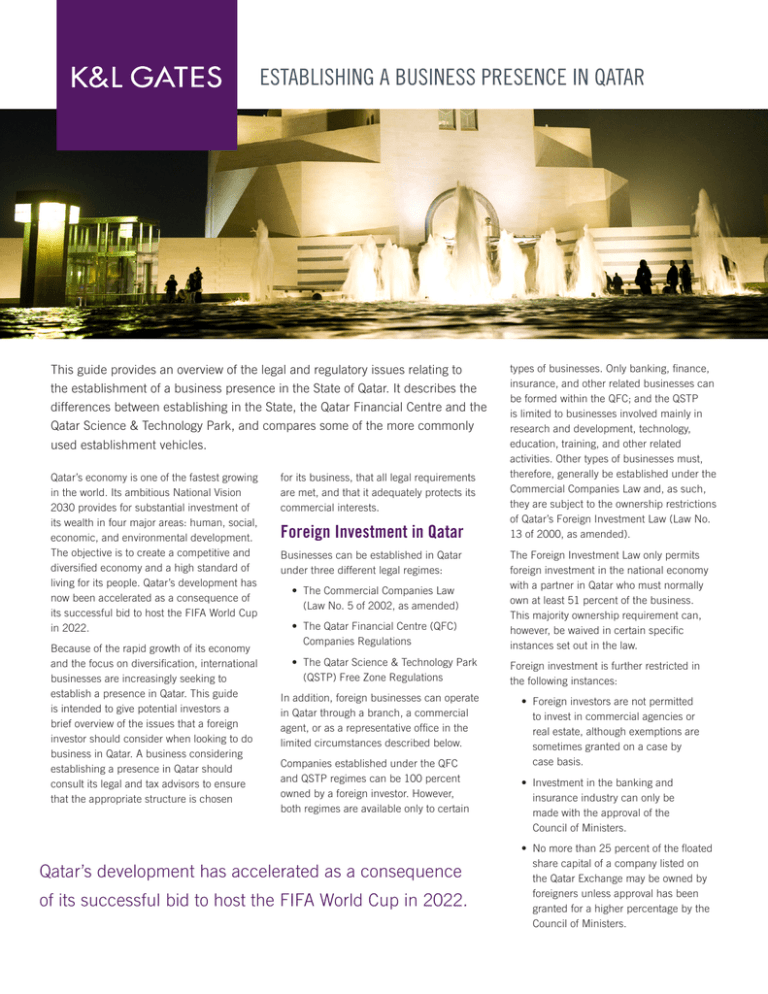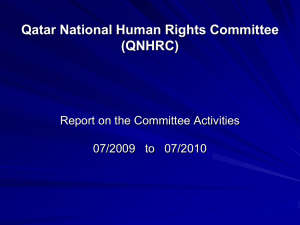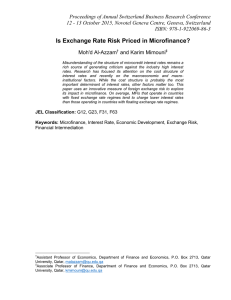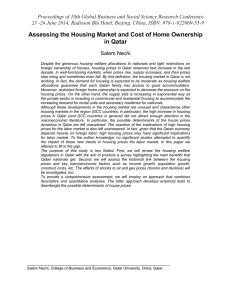ESTABLISHING A BUSINESS PRESENCE IN QATAR
advertisement

ESTABLISHING A BUSINESS PRESENCE IN QATAR This guide provides an overview of the legal and regulatory issues relating to the establishment of a business presence in the State of Qatar. It describes the differences between establishing in the State, the Qatar Financial Centre and the Qatar Science & Technology Park, and compares some of the more commonly used establishment vehicles. Qatar’s economy is one of the fastest growing in the world. Its ambitious National Vision 2030 provides for substantial investment of its wealth in four major areas: human, social, economic, and environmental development. The objective is to create a competitive and diversified economy and a high standard of living for its people. Qatar’s development has now been accelerated as a consequence of its successful bid to host the FIFA World Cup in 2022. Because of the rapid growth of its economy and the focus on diversification, international businesses are increasingly seeking to establish a presence in Qatar. This guide is intended to give potential investors a brief overview of the issues that a foreign investor should consider when looking to do business in Qatar. A business considering establishing a presence in Qatar should consult its legal and tax advisors to ensure that the appropriate structure is chosen for its business, that all legal requirements are met, and that it adequately protects its commercial interests. Foreign Investment in Qatar Businesses can be established in Qatar under three different legal regimes: types of businesses. Only banking, finance, insurance, and other related businesses can be formed within the QFC; and the QSTP is limited to businesses involved mainly in research and development, technology, education, training, and other related activities. Other types of businesses must, therefore, generally be established under the Commercial Companies Law and, as such, they are subject to the ownership restrictions of Qatar’s Foreign Investment Law (Law No. 13 of 2000, as amended). •The Qatar Financial Centre (QFC) Companies Regulations The Foreign Investment Law only permits foreign investment in the national economy with a partner in Qatar who must normally own at least 51 percent of the business. This majority ownership requirement can, however, be waived in certain specific instances set out in the law. •The Qatar Science & Technology Park (QSTP) Free Zone Regulations Foreign investment is further restricted in the following instances: In addition, foreign businesses can operate in Qatar through a branch, a commercial agent, or as a representative office in the limited circumstances described below. •Foreign investors are not permitted to invest in commercial agencies or real estate, although exemptions are sometimes granted on a case by case basis. •The Commercial Companies Law (Law No. 5 of 2002, as amended) Companies established under the QFC and QSTP regimes can be 100 percent owned by a foreign investor. However, both regimes are available only to certain Qatar’s development has accelerated as a consequence of its successful bid to host the FIFA World Cup in 2022. •Investment in the banking and insurance industry can only be made with the approval of the Council of Ministers. •No more than 25 percent of the floated share capital of a company listed on the Qatar Exchange may be owned by foreigners unless approval has been granted for a higher percentage by the Council of Ministers. The Investment Vehicle Single Person Company Foreign investors who wish to conduct business in Qatar on a regular basis must establish a legal presence within Qatar through one of the following means: • Establishing a branch office. This type of company can be used by investors who have obtained a waiver to the 49 percent ownership cap because, for example, they are investing in one of the priority sectors referred to in the Foreign Investment Law. Minimum paid up capital is QR 200,000. •Entering into a commercial agency relationship with a local agent. Shareholding Company • Incorporating a company. •Registering a trade representative office. •Incorporating or registering through either the Qatar Financial Centre or the Qatar Science & Technology Park. The type of establishment that will most closely match the commercial objectives of the entrant will depend on a number of factors, including, most importantly, the nature of the business and the commercial objectives of the business owners. Company Structures The Commercial Companies Law provides for businesses to be established in Qatar in a variety of corporate forms. The ones most commonly used by foreign investors are the following: Limited Liability Company The LLC is the most commonly used corporate entity because it can be formed relatively quickly and requires a relatively small amount of capitalisation (QR 200,000). Notwithstanding the 49 percent cap on foreign ownership, which will apply unless an exemption is granted, the law currently permits LLC formation documents to provide for a disproportionate distribution of profits (and losses). Other key features of the LLC are: •Ten percent of the net annual profit must be retained by the company until the legal reserve capital requirement is met (50 percent of share capital). •The company may not raise additional capital by public subscription and it may not issue freely transferable shares or bonds. •Existing shareholders enjoy pre-emptive rights in respect of any shares offered for sale, unless that right has been waived by the other shareholders. Shareholding companies can be established with a minimum of five shareholders and may be either privately or publicly held. Privately held companies require a minimum paid-up capital of QR 2 million. Publicly held companies, which are typically listed on the Qatar Exchange, require a minimum paid-up capital of QR 10 million. The foreign investment restrictions applicable to both types of companies apply, that is a maximum foreign ownership of 49 percent for privately held companies and 25 percent for listed companies, unless an exemption has been granted. The Commercial Companies Law also permits general and limited partnerships, unincorporated joint ventures, and holding companies to be formed in Qatar, but these types of entities may not be appropriate for foreign investment in most instances. Branch Offices The Foreign Investment Law provides for the issuance of a branch license to foreign companies for “government qualified” projects pursuant to contracts with the government or a quasi-government entity. A local partner is not needed for the conduct of such projects. These licenses are limited to the conduct of business in Qatar for the specific project and they expire once the contract is completed. Other types of companies (for example, engineering and auditing firms) are also permitted to register branches in Qatar although the requirements are quite strict and need to be examined carefully before attempting to proceed. Commercial Agencies Foreign businesses that wish to sell their goods in Qatar but do not wish to establish a presence in the country may appoint a local agent to market their goods and services in Qatar pursuant to the Commercial Agents Law (Law No. 8 of 2002, as amended). This law, which permits commercial agency contracts to be registered, provides the commercial agent with various protections, including the exclusive right to import the goods that are subject to the contract, the right to receive commission on all sales of the goods within the designated territory even if the sales are not due to the activities of the agent, and compensation for termination of the agency unless for justifiable cause. Representative Offices Currently, a foreign company can register a representative office in Qatar in order to market and promote its business in Qatar pursuant to Decision No. 142 of 2006 issued by the Ministry of Business and Trade. Although the representative office may be registered in the Commercial Registry and employ staff in its own name, it is akin to a “shop window” and is not permitted to engage in selling or entering into contracts in Qatar. Qatar Financial Centre The QFC is established by the Government of Qatar to provide a platform for investment in Qatar and in other expanding economies in the region with a particular focus on financial services, asset management, insurance and reinsurance. It is intended to create a world class legal and business infrastructure for firms licensed and authorised to do business by the QFC. ABOUT K&L GATES Our lawyers based in Qatar advise international clients doing business in the country and in the wider Middle East and North Africa region, as well as clients in Qatar both domestically and abroad, with particular emphasis on projects, energy and infrastructure (including transportation), banking and finance (including Islamic finance), telecoms, media and technology, real estate and construction, intellectual property, and dispute resolution. They have considerable experience and industry connections in Doha and internationally and can leverage the proven capabilities of K&L Gates throughout our network of offices in the Middle East, the United States, Europe, Asia, and Latin America to provide our clients with high quality, fully integrated and seamless service wherever they happen to be doing business. The QFC is operated by the Qatar Financial Centre Authority (QFCA) which provides administrative functions for the QFC and for the firms licensed within it. The Qatar Financial Centre Regulatory Authority (QFCRA) serves as the independent regulator of the QFC, with power to authorise, supervise, and discipline QFC licensed firms. There is also a QFC Companies Registration Office (CRO) which registers firms established within the QFC. Organisations that conduct activities that are commonly recognised as constituting financial services, or activities in support of financial services business, can be established within the QFC with 100 percent foreign ownership. The types of activities that can be conducted by QFC licensed firms (referred to as “permitted activities”) are divided into two categories. They are: •Regulated activities, which are those undertaken by financial and insurance firms for which pre-authorisation by the QFCRA is required and which are subject to close ongoing supervision. •Non-regulated activities, which are those undertaken by firms such as legal, accounting, audit and tax firms for which no QFCRA authorisation is required. Entities wishing to conduct permitted activities within the QFC can do so by either incorporating a company or partnership within the QFC or by registering a branch of a non-QFC entity with the CRO. The QFC permits various types of legal entities to be licensed, including limited liability companies, general and limited partnerships, and protected cell companies. All QFC licensed firms are subject to oversight by and reporting to the QFCA and, in the case of firms conducting regulated activities, by and to the QFCRA. All firms are subject to the QFC’s strict anti-money laundering regime and QFCRA regulated firms are subject to the QFCRA’s financial services regulatory regime which is based on international standards. Qatar Science & Technology Park The QSTP is a science and technology free zone located in the Education City. It is a part of the Qatar Foundation and is intended to be a home for technology based companies from around the world. Its location and status as a free zone provide companies with a number of incentives to establish a presence in the QSTP. These incentives include 100 percent foreign ownership, no tax, the ability to trade directly in the Qatar economy, duty-free import of goods and services, unrestricted repatriation of capital and profits, and close access to premier universities at Qatar Foundation. Companies must meet certain criteria before they can incorporate or register in the QSTP. As a science park, the focus of the QSTP is research, design and training. Therefore, a majority of a company’s activities in the QSTP must contribute to the advancement of technology. Contributing activities include applied research, development and testing of products and services, and technologyrelated training, which should represent an investment in the company’s corporate technology portfolio. The QSTP allows foreign entities to incorporate within it or to set up a branch office. Both registered branches and QSTP companies require a license. The QSTP provides three tiers of license: •Standard License, which is issued to businesses that incorporate in the free zone as a QSTP LLC or register a branch office. The QSTP LLC must have at least two shareholders and a minimum capital of QR 200,000. Holders of a standard license are entitled to all of the free zone benefits. •Restricted License, which is issued to individuals and business entities that do not qualify for a Standard License. The free zone benefits are limited and granted at the discretion of QSTP management. •Service License, which is issued to entities providing services to the QSTP. Holders of this type of license are not entitled to any of the free zone benefits. Finally The structure to be used by a business seeking to establish a presence in Qatar is dependant upon a number of legal, licensing and tax considerations, and upon the level and location of the business that is likely to be transacted in the region. In addition to the legal considerations described in this brief overview, businesses considering establishing a presence in Qatar should also discuss all issues relating to import, tax, real estate, procurement, immigration, employment, intellectual property, dispute resolution, anti-money laundering, and local customs with their legal and tax advisors. We are happy to provide more specific advice on request. Learn more about our Qatar business practice at klgates.com. Amjad Hussain Partner, Doha +974 4424 6119 amjad.hussain@klgates.com Pawel Chudzicki Partner, Doha +974 4424 6108 pawel.chudzicki@klgates.com 11001 Contact: Anchorage Austin Beijing Berlin Boston Brisbane Brussels Charleston Charlotte Chicago Dallas Doha Dubai Fort Worth Frankfurt Harrisburg Hong Kong Houston London Los Angeles Melbourne Miami Milan Moscow Newark New York Orange County Palo Alto Paris Perth Pittsburgh Portland Raleigh Research Triangle Park San Diego San Francisco São Paulo Seattle Seoul Shanghai Singapore Spokane Sydney Taipei Tokyo Warsaw Washington, D.C. Wilmington K&L Gates practices out of 48 fully integrated offices located in the United States, Asia, Australia, Europe, the Middle East and South America and represents leading global corporations, growth and middle-market companies, capital markets participants and entrepreneurs in every major industry group as well as public sector entities, educational institutions, philanthropic organizations and individuals. For more information about K&L Gates or its locations, practices and registrations, visit www.klgates.com. This publication is for informational purposes and does not contain or convey legal advice. The information herein should not be used or relied upon in regard to any particular facts or circumstances without first consulting a lawyer. ©2014 K&L Gates LLP. All Rights Reserved.





